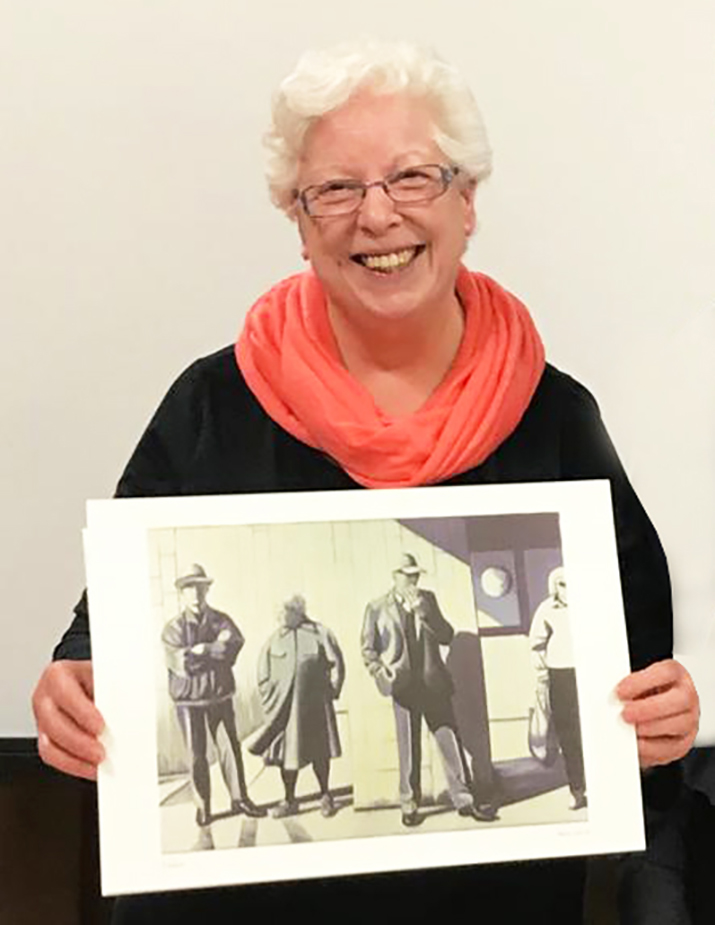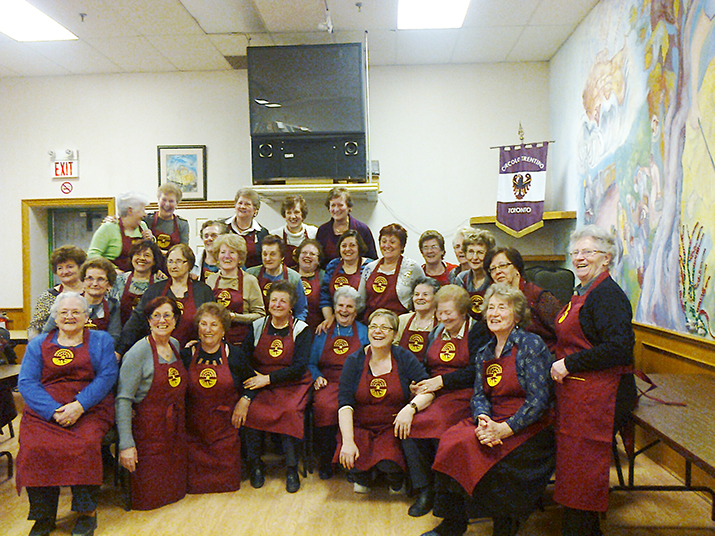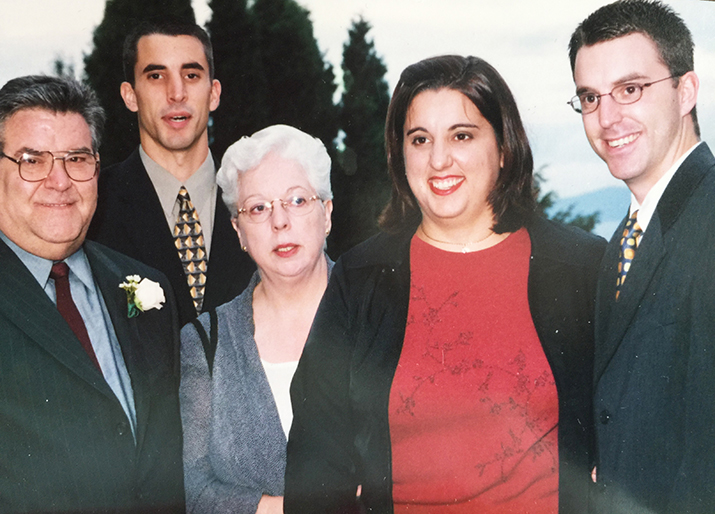STORIES OF TRENTINO PEOPLE IN THE WORLD
LUCIA LARENTIS FLAIM'S EXPERIENCE AMONG EMIGRANT WOMEN
We asked various descendants of Trentino emigrants to tell their stories firsthand, emphasizing how their origins have guided and influenced them in life. This would not have been possible without the active and cordial collaboration of the “Trentini nel Mondo” Association, founded in 1957, working for social solidarity and as support for aggregation and assistance for Trentino migrants and their descendants. This month’s figure is the social activist from Trentino Lucia Larentis Flaim, in Canada since 1970.
I discovered emigration by verifying firsthand the truth in the popular saying «where there is Gigi there is Paris». In August 1969, at the age of 25, as best man at the wedding of a dear friend in Revò, I met a cousin of hers who was on holiday in his hometown after six years in Canada. That I fell head over heels is an understatement! He returned to Toronto starting a daily correspondence which lasted until the following April when he returned to Trentino: I married Thomas Flaim on 24 May 1970. We arrived in Toronto after a honeymoon tour around Italy, which my husband did not know at all.
Each of us did everything we could to alleviate the suffering of those in need
I was then "discovered" by the Trentini in Toronto in the summer of 1972 when the then archbishop of Trento, Monsignor Alessandro Maria Gottardi, came to Canada on a pastoral visit and stopped off in Toronto at COSTI (Centro Organizzativo Scuole Tecniche Italiano), the place where I worked, and which had been co-founded by a Trentino engineer Lino Magagna.
The group which accompanied him recognized the Trentino origins of the Flaim surname and after some correspondence I began to collaborate with them. In this way, I also helped my husband to get to know the Trentino community, unknown to him because he was completely immersed in Canadian circles due to his work as a chef.
Moral of the story? I was the first woman to join the Board of Directors of the “Trentino Club of Toronto” where I changed roles according to necessity and based on what I was able to do: from secretary taking minutes for external relations to correspondence with the autonomous Province of Trento and “Trentini in the World” as well as public relations and so on. I was also president of the Club from 2004 to 2012. And from 1984 to 2018 I was part of the Consulta provinciale dell’emigrazione (Trentino emigration council).
In the meantime, I had started working at Ryerson University and the family had grown with Roger, Nadia and Eric who, although born in Toronto, were taken to Trento – my birthplace - to be baptized in the church of San Pietro, the same where I had been married.
In 1982, it was Toronto's turn to host the Ittona Convention (the federation that brings various Trentino associations in the United States and Canada together), an event that takes place every two years. After overcoming the initial doubts of those who considered my ideas to be too new, progressive and innovative, I convinced the organizers that it would be appropriate to make the Convention an opportunity to take a dive into contemporary Trentino, which had changed since the days of emigration to North America. In the program of the initiative, alongside the traditional moments of celebration and conviviality, we included exhibitions of Trentino books, craftsmanship, photographs by Flavio Faganello and a performance by the Sat Choir, all proposals that the then president of the autonomous Province of Trento, Flavio Mengoni, approved and supported.
I became a good Canadian because I had been a good Trentino
In those same days there was also an event that I remember with great joy: the SAT Choir performed in Ottawa, in the presence of the Canadian Prime Minister of the time, Pierre Elliott Trudeau, who expressed great appreciation for how the Canadian national anthem was performed.
Two years later, at the Ittona Convention in Chicago the same formula was proposed, as in subsequent meetings. When the Convention returned to Toronto in 2010, the writer Alberto Folgheraiter presented his book in English, “Beyond the Threshold of Time” and there were various workshops. The one that stood out was on volunteering, enriched by the enthusiasm of the new generations to learn of the Trentino culture and roots.
Meanwhile, I was contemplating what to do for the women of Trentino so, supported by Gino Osti, president of the Club at that time and teased by those same women when we met on different occasions, I founded the Trentino Women's Group in November 1983. This initiative led women to be aware of their value and their past and future abilities, to care about others and to understand that every experience, however negative it may be, was a life lesson and was something to learn from. Their minds opened to the view of the motto «one for all and all for one» which made them appreciate the value of being part of a group. So, we organized meetings with experts, social gatherings, bingo games, theatrical performances, quilting get-togethers (to sew typical Canadian quilted blankets), potluck dinners where everyone brought food to share with the other participants and trips to discover Ontario and Toronto plus a memorable trip to Trento. These, and our various acts of charity, not only livened up the Trentino community but brought a certain prestige to our Group. We started by supporting an Argentinian student in his four years of university. Then there was the construction of houses and wells for a village in Kerala, India and subsequently support of the Kidney Foundation of Canada for the summer camp for children with kidney diseases and for children suffering from heart problems at the Sick Kids Hospital in Toronto.
I don't have a complete list of what we did, which would be very long, I only know that each of us did the best we could to alleviate the suffering of those in need.
At the same time my motto was "help you to help yourself" and I felt happy to see how much we had all grown together in maturity, confidence and awareness. Furthermore, we have always preferred to "give" aiming to make a difference and consequently feel satisfied, avoiding contributing only with money, with the risk that it would only end up in the customary pot. Among the many episodes, I remember one with great tenderness. The earthquake in Abruzzo caused great emotion and we noticed that the Fire Brigade of Trento and its province were among the first to rush to help and so our contribution went to support their summer camp in Trentino, in which some young girls from Abruzzo also took part.
Now we, Trentino Women in Toronto, may only be two dozen, some with walking sticks, others unable to get around but we continue to do our duty for the Kidney Foundation and the Sick Kids Hospital, meeting in the afternoon instead of in the evening, because it is easier to drive the car during the day. Probably the Group, and I say this with great serenity, will die a natural death since I was unable to make the generational transition, for society, science and technology have indeed made giant strides, but sometimes leaving those who might have needed interpersonal and community relationships without guidance.
I will finish up by saying that in what I have written so far, I have only referred to things that have happened and not about feelings, defeats, conquests, sensations, dreams, doubts, but with the deepest conviction that I became a good Canadian because I had been a good Trentino.

Lucia Larentis Flaim

The Trentino Women's Group in 2012

Lucia Larentis Flaim with her family





